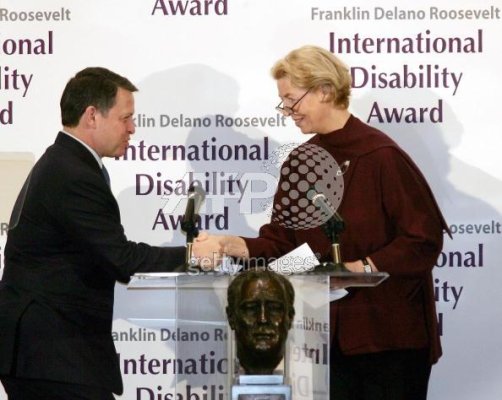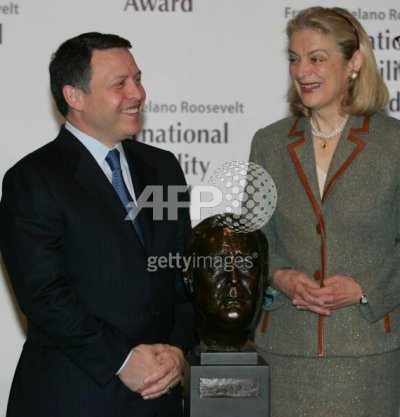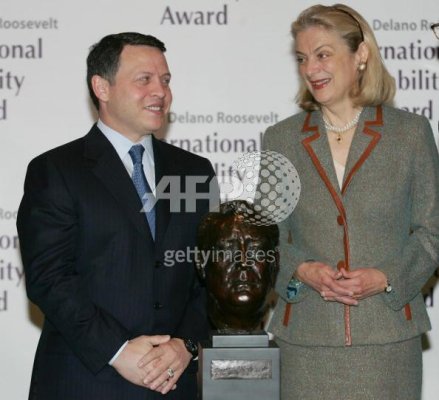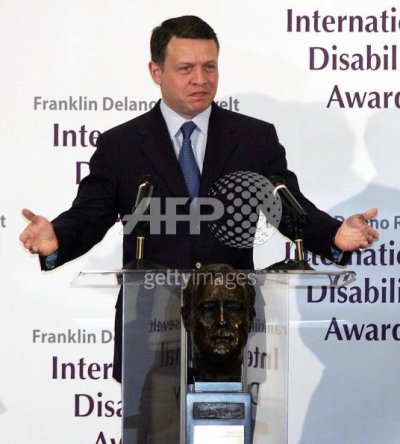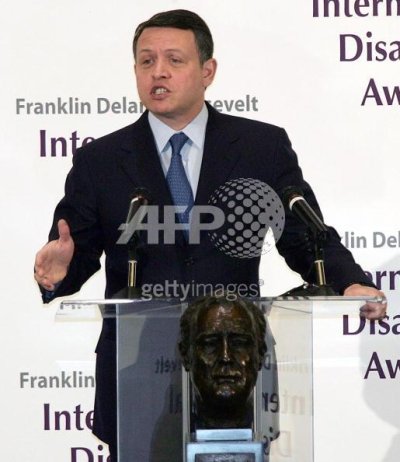Jordan wins FDR award
NEW YORK (Petra) — His Majesty King Abdullah on Wednesday said Jordan was committed to ensuring that its social, educational and economic systems were open to disabled citizens. Accepting the Franklin Delano Roosevelt International Disability Award at the UN headquarters here, King Abdullah said Jordan, which was the first Arab country to win the award, was “convinced that a comprehensive approach to development and reform helps all society advance.”
“Every person has a right to make the most of their life. And every person has a contribution to make to their nation,” the King told a ceremony.
Speakers during the event praised Jordan's efforts to enact legislations that guarantee the disabled equality, as well as King Abdullah's endeavours to achieve peace and prosperity in the entire region.
They included UN General Assembly President Jean Ping, Nane Annan, spouse of UN Secretary General Kofi Annan who delivered an address on his behalf, and Vice Chairman of the World Committee on Disability Michael de Blant. Others included Anna Eleanor Roosevelt, the granddaughter of Franklin and Eleanor Roosevelt and co-chair of the Franklin and Eleanor Roosevelt Institute, Ambassador William vanden Heuvel, co-chair of the institute, and Robert David Hall, chairman of the National Organisation on Disability (NOD).
The award is given out by the Franklin and Eleanor Roosevelt Institute and the World Committee on Disability. It recognises outstanding action in support of the United Nations World Programme of Action Concerning Disabled Persons, adopted by the General Assembly in 1982.
A NOD statement said the award “acknowledges Jordan's exemplary efforts to improve the lives of people with disabilities in their country, as called for by the UN World Programme of Action Concerning Disabled Persons.”
According to the statement, Jordan was one of the first Middle Eastern countries to enact disability-specific legislation and introduce building codes aimed at accessibility.
Commenting on the event, HRH Prince Raad Ben Zeid, chief chamberlain, wrote an article reviewing the award's history and Jordan's achievements concerning the welfare of the disabled.
Prince Raad said the Kingdom played a key role in entrenching the principles promoted by the UN World Programme of Action Concerning Disabled Persons.
He added that Jordan's efforts dated back to 1993 when the Kingdom issued the “Law for the Welfare of Disabled Persons.” Subsequently, the National Council for the Welfare of Disabled Persons was established, he said, to set and evaluate policies on people with special needs.
Following is the full text of the King's remarks at the ceremony:
I am honoured to accept this award, on behalf of all Jordanians — including those with disabilities — who are working with such success to improve the lives and futures of disabled people.
I am especially mindful, today, that in just a few weeks, it will be exactly 60 years since the world mourned the death of Franklin Delano Roosevelt. This was a man who — from the prison of his own leg-braces — championed global freedom. In the largest sense, Roosevelt understood that if this earth is to prosper and thrive, all people must have access to the promise.
He worked to create a better life, not for himself alone, or his country alone, but for the people of the world.
Today, those of us who are working for global development and reform, take inspiration from Roosevelt's model. We know that free and successful societies must open the doors to opportunity and hope for all. Because every person has a right to make the most of their life. And every person has a contribution to make to their nation.
This philosophy is the centrepiece of Jordan's commitment to the disabled. It begins with the devoted work of so many people. I think first and foremost of my father, His late Majesty King Hussein, and his enduring message that every member of the Jordanian family is precious. I think also of dedicated public officials, and members of non-governmental organisations, and even private citizens, who have taken tremendous initiative.
A key milestone was Jordan's 1993 “Law for the Welfare of Disabled Persons.” This law affirms the right of disabled citizens in society. It also established Jordan's National Council for the Welfare of Disabled Persons. This council brings together leaders from across society, to speak for the disabled. The council's great work has resulted in a wide range of programmes to diagnose, treat, and accommodate disabled citizens.
Let me note just a few examples: New, early detection programmes. New, advanced-medicine genetic counselling. Free health insurance cards for the disabled. Specially designed educational facilities. A new building code. A university education, with 90 per cent of the tuition paid, for disabled Jordanians who pass the secondary schools exam. A special enforcement unit to oversee job opportunities. Sign Language on national TV news, and also in mosques during Friday prayers. And in the works is a national training centre for community-based rehabilitation.
Jordan has also joined the international community in supporting sports activities. We were very proud of Jordan's participation in the recent Athens Para-Olympic Games.
It must be said that historically, developing countries have faced a special challenge in assisting those with disabilities. In hard-pressed economies, it may seem difficult to meet exceptional needs: Specialised healthcare and education; community and workplace accommodation; adequate transportation and communication services. The damage created by regional conflict can also hold back progress.
Jordan's approach to its challenges has been to invest in our strengths. We are convinced that a comprehensive approach to development and reform helps all society advance. And so we have committed to ensuring that our social, educational and economic systems are open to our disabled citizens.
But in this interlinked world, no country succeeds alone. As we go forward, we seek the support of all members of the United Nations, in drafting the convention for the rights of people with disabilities. Let us work together for this shared goal with a maximum sense of urgency.
I would like to take this opportunity to express my deepest appreciation to all the Jordanians whose work is recognised by today's award. They include countless government officials and parliamentarians. And many individuals, including members of my family, who have worked their hearts out for these issues over many decades.
I must also express my gratitude to the many dedicated representatives of the international community and NGOs. I think we have all taken inspiration from the dynamism and hard work of Lord Morris of Manchester, a pioneer for disability rights. I would especially like to thank Chairman of the World Committee on Disability Alan Reich, Ambassador William vanden Heuvel of the Franklin and Eleanor Roosevelt Institute, distinguished members of the Roosevelt family, and Secretary General Kofi Annan and his UN team.
My friends, in 1931, F.D.R. called support for the disabled “a great cause, one of the greatest causes of humanity.” Today, it is our cause. Jordan is proud to be part of that effort. We invite all people to join us in working for a future of opportunity and hope.
Thank you very much.
Thursday, March 24, 2005
link:
http://www.jordantimes.com/thu/homenews/homenews1.htm


